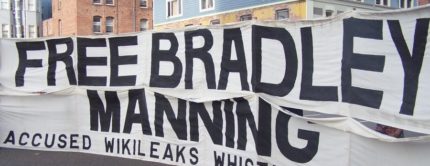Bradley Manning, the soldier who is being court-martialed for leaking reams of secret government files to WikiLeaks, got some good news from the militar judge in his case yesterday. Col. Denise Lind ruled at a pretrial hearing that prosecutors will have to prove beyond a reasonable doubt that Manning had “reason to believe” that the files could be used to harm the United States or to aid a foreign power.
Manning, whose trial is scheduled to begin on June 3, has confessed to having provided to WikiLeaks videos of airstrikes in which civilians were killed, a quarter-million diplomatic cables, assessment files of detainees held at Guantánamo Bay, and logs of military incident reports from Iraq and Afghanistan.
Manning’s guilty plea to 10 lesser charges carries a maximum sentence of 20 years in military prison. But in an extremely rare move for a criminal defendant, Manning pleaded guilty to those charges without making a deal with the military about the 12 more serious charges against him. Military prosecutors said they would attempt to court martial Manning on the remaining charges, such as “aiding the enemy,” which carries a potential life sentence.
Manning has been in prison for nearly three years — at least eight months in conditions described by U.N. special rapporteur on torture Juan Ernesto Mendez as “cruel, inhuman and degrading.”
Lind ruled on the stipulations surrounding the testimony of the member of the team that raided al-Qaida’s compound in Abbottabad, Pakistan, in 2011 and killed Osama bin Laden. The squad member is expected to testify that he removed digital material from the compound that was later found to have contained WikiLeaks documents, apparently requested personally by Bin Laden.
The judge said the squad member’s evidence will be given at an undisclosed alternate location and he will be allowed to dress in civilian clothes and “light disguise” to conceal his identity. During his testimony, Manning’s defense team will not be allowed to stray in their cross-examination from a narrowly defined and pre-agreed list of questions relating directly to the charges that Manning faces. They will not be allowed to question him about his training or preparation for the Abbottabad raid, or about how the Bin Laden killing was carried out.
The prosecution intends to call him as part of its mission to prove that Manning “aided the enemy.”
In addition to the John Doe, three other classified witnesses will testify anonymously in secure locations behind closed doors. The U.S. government also wants to call 24 more people whose testimony will raise issues of confidentiality and is asking the court for permission for some or all of their testimony to be heard in secret session. The 24 witnesses range from military chiefs from the army and navy to Defense and State Department officials and intelligence experts.


